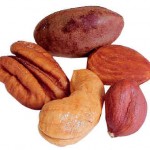 Nuts are tasty, loaded with good fat, protein, fiber, nutrients and phytochemicals that are heart healthy and potentially good for the waistline. Barring allergies, there aren’t many reasons not to include nuts in your diet. Let’s take a look at some interesting studies, tips and tidbits about nuts.
Nuts are tasty, loaded with good fat, protein, fiber, nutrients and phytochemicals that are heart healthy and potentially good for the waistline. Barring allergies, there aren’t many reasons not to include nuts in your diet. Let’s take a look at some interesting studies, tips and tidbits about nuts.
Nuts and the Heart
A study of 31000 Seventh Day Adventists that ate nuts more than 4 times per week were half as likely to die of a heart attack than those who ate nuts less than once a week. The Iowa Women’s Health Study came to a similar conclusion: Women who ate nuts or seeds 4 times per week were 40% less likely to die from heart disease than similar women who didn’t eat nuts. The Nurses’ Health Study showed that those who ate at least 140g/week of nuts were 35% less likely to be diagnosed with heart disease than those who ate less than 30g/month.
Nuts and Weight
Most studies have shown that adding nuts to the diet does not cause people to gain much weight, if any at all. As an example, researchers gave participants 45-70g of almonds every day (320 calories worth) and gave them no further instructions about food intake. After 6 months, participants gained a very miniscule amount of weight (.2 lbs in women, 1.4 lbs in men). This study was funded by the almond industry.
There aren’t many studies that show nut consumption to help people lose weight, but one study showed that a low calorie diet that included almonds led to greater weight loss than an equal calorie diet that did not include almonds.
The Seventh Day Adventist and Nurses Health Study showed that those who regularly ate nuts weighed less than those who did not.
The Best Nuts
Are some nuts better than others when it comes to health benefits? All nuts contain good fats, fiber and proteins, but different kinds of nuts have different nutrient profiles.
Almonds are richest in vitamin E (35% recommended daily intake) and calcium (8%) per 1 oz. (30g) serving. Brazil nuts are highest in selenium with just 1 supplying a days worth. Cashews are richest in copper and zinc. Peanuts (technically a legume) contain the antioxidant resveratrol, and are highest in protein and arginine content. Walnuts have the most alpha linolenic acids (plant-based omega-3’s).
Although nuts are healthy, they are a dense source of calories. For example, 1oz/30g of nuts supply about 170-180 calories. Here is a chart that shows how many nuts are in 30g.
Number of Nuts in 30 grams (1oz)
- Almonds: 20-24
- Brazil nuts: 6-8
- Pecans: 18-20 (halves)
- Cashews: 16-18
- Pine Nuts: 150-157
- Pistachios: 45-47
- Walnuts: 8-11
- Hazelnuts: 18-20
Stephen Trenen is a trainer in a sport club and he runs his own informative website about Best Diet Plans, check it out to learn more tried-out Diet Plans.